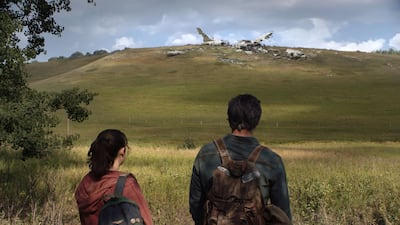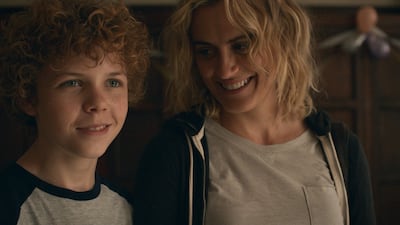At the very beginning of HBO’s stunning new series The Last Of Us, a scientist — played by John Hannah — is on a talk show explaining the possibilities of a viral, brain-altering infection spreading, thanks to global warming. When the slightly nervous host asks what happens if it takes hold, the reply is unequivocal: “We lose.”
Undoubtedly, these very words went through the minds of devotees of the best-selling video game that inspired the show, the moment they heard an adaptation was in the works. Hollywood’s track record with console titles is notoriously poor, right back to the days of Street Fighter and Super Mario Bros. (with Bob Hoskins, appallingly cast as the dungaree-wearing plumber Mario).
Even as games became sophisticated ventures, massive in scale and ambition, Hollywood seemed unable to capitalise. Like the hugely cinematic noir Max Payne, reduced to a thuggish beat’-em-up vehicle for Mark Wahlberg. Or Assassin’s Creed, a stealth adventure series with franchise potential that even a talented director such as Justin Kurzel fumbled.
The same fate could so easily have befallen The Last of Us. Released in 2013 by Naughty Dog, selling 37 million copies, it was rightly considered a high point in video game evolution. Set years after a virus infected millions, the emotionally-charged story features a middle-aged survivor, Joel, escorting young teen Ellie, who may be the key to humanity’s survival, across a zombie-strewn post-apocalyptic America.
The rival video game series Resident Evil had already inspired the explosion in zombie TV shows and movies, from Danny Boyle’s 28 Days Later to AMC show The Walking Dead, which concluded last November after 11 seasons. But while The Last of Us came late to the party, it injected new life into the living dead, finding a story that concentrated on a surrogate parent-child relationship.
Naughty Dog's action-adventure series Uncharted has already turned into a middling movie with Tom Holland, albeit a profitable one, taking $401 million worldwide. That film re-pitched its swashbuckling hero Nathan Drake as much younger, a move seen as sacrilegious by some. This allowed Wahlberg — yes, him again — to play Drake’s friend/mentor Sully. Reviews were fine, but hardly gushing.
Yet The Last of Us creator Neil Druckmann clearly didn’t want to settle for that. The Evil Dead’s Sam Raimi was initially attached to direct, but Druckmann struggled to compress the game’s storyline into a workable feature film script. The project thankfully languished, until Druckmann was introduced to Craig Mazin, fresh off his hugely successful drama Chernobyl. Their pairing is probably the greatest thing to happen to video games since the invention of the 32-bit processor.
Already, the early five-star reviews for The Last of Us suggest that — finally — its backers HBO might’ve filled the hole left by their mega-popular fantasy Game of Thrones. Curiously, two actors from that show were cast as the leads. Chilean-American Pedro Pascal, who played Thrones’ Red Viper, became Joel. English youngster Bella Ramsey, who made her screen debut as Lyanna Mormont in the series, took on Joel’s spiky young charge.
While there were doubters online who sniped at their casting (some even concerned that Pascal wasn’t capable of growing a full beard like Joel), it’s easy to see just how perfectly they slot into the roles. Pascal excels as the taciturn protector, haunted by his own losses. Ramsey, likewise, has the right energy for the know-it-all Ellie, an orphan who has been bitten by one of the "infected" and miraculously survived.
As Mazin recently told The Hollywood Reporter, “The way to break the video game curse is to adapt the best video game story ever — not by a little, but by a lot.” Turning The Last of Us into a nine-episode drama allows Druckmann’s story to blossom and branch off in unexpected ways. No spoilers here, but episode three, for example, flashes back to 2007 (four years after the outbreak) to sidestep into the story of survivor Bill, played by Nick Offerman, a relatively minor character in the game.
Although there are deviations, the central Joel-Ellie spine remains largely faithful to the original narrative. Better still, the production team — including Druckmann, who even directs on the show — have captured the atmosphere of the game in spades. The devil is in the details, right down to Ellie’s burgundy-coloured hoodie and Joel’s denim shirt. Crumbling buildings, overgrown, dank and musty, will feel hugely familiar to any player. And those terrifying Clickers, the Zombie-ish creatures that swathes of humanity have become, are terrifyingly realised.
With the benchmark now massively raised, Hollywood should take note. Episode one concludes with a battle cry — British synth-pop legends Depeche Mode’s anthem Never Let Me Down Again blasting on radio. The opening line “I’m taking a ride/With my best friend” feels like a nod to the road trip that awaits Joel and Ellie. But the title? That could be every video game fan who has ever been disappointed by Hollywood. Until now. We lose? Not any more.
HBO’s The Last Of Us is available now on OSN+
Scroll through images of the most anticipated TV shows of 2023 below















